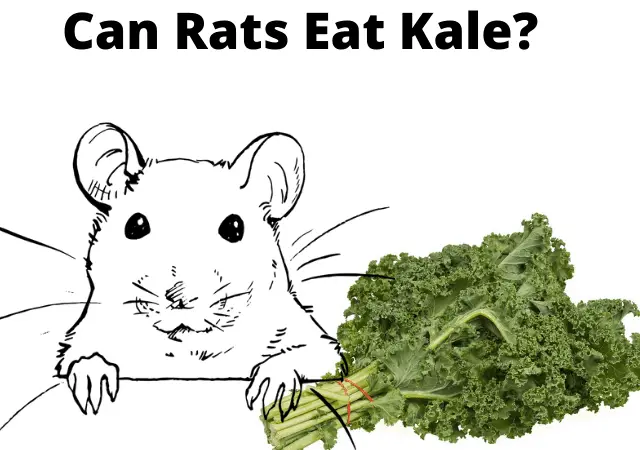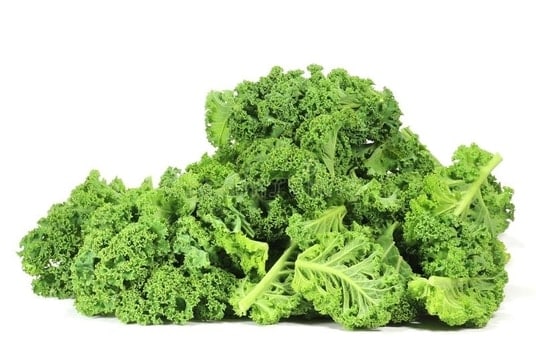In this post, I’m going to go over the question: can rats eat kale?
If you’re the owner of a pet rat I’m sure you have lots of questions about what they can and can’t eat. After all, you want to make sure that you give them food that’s good for them so that they can thrive and be as healthy as possible.

Kale is one of the healthiest vegetables on the planet. At least, for humans, it is. But is it also good for rats? After all, foods that are good for us humans are not always good for our pets. In order to find the answer to this question, I did some research to determine if there’s anything in this vegetable that can be harmful to the health of pet rats. I’ll share my findings with you here today. Let’s get started!
The short answer is this: Yes, rats can eat kale without any problems. This vegetable contains many essential vitamins and minerals that your rat will benefit from. In addition, since it’s so low in calories and fat there’s not a large risk of overfeeding your rat.
What’s in kale?

Kale is a vegetable in the cabbage family. The plant is originally from the East-Mediterranean and Asia Minor. Nowadays, it’s grown all over the world. It’s one of the most nutrient-dense foods on the planet.
In order to find out if this vegetable is good for rat consumption, let’s take a look at what nutrients kale contains.
100 grams of this vegetable contains the following macronutrients:
- 28 calories
- 0.4 grams of fat
- 5.6 grams of carbs
- 2 grams of fiber
- 1.3 grams of sugar
- 1.9 grams of protein
If you take a look at the nutritional profile above you can see that kale is very low in calories while having a decent amount of fiber and protein.
In addition, kale contains the following vitamins and minerals
Vitamin A
If you want to nitpick, kale doesn’t actually contain vitamin A in itself. However, it does contain beta carotene which rats can convert to vitamin A in their bodies, just like humans can. This vegetable is very rich in beta carotene, which means it gives your rat a good amount of vitamin A.
Vitamin A is essential for your rat. Studies have shown that if rats don’t get enough vitamin A they can develop anemia and dehydration.
Vitamin K
Another vitamin that this vegetable is very rich in is vitamin K. Vitamin K is essential for rodents like rats and mice because it helps them with blood clotting. If they do not get enough of it they can develop bleeding problems.
Vitamin C
Most vegetables contain vitamin C and kale is no exception. It contains a good amount of this vitamin. Vitamin C is an antioxidant that helps your rat’s immune system and prevents DNA damage. Biologic tests have shown that rats can synthesize their own vitamin C in their bodies. Nevertheless, dietary vitamin C that they can get through foods is not bad for them by any means.
Manganese
Manganese is a mineral that kale is quite rich in. For rats, manganese helps their brain function properly and it’s also beneficial for their nervous system.
Other vitamins & minerals
On top of these, kale also contains decent amounts of B vitamins, copper, calcium, potassium, antioxidants, iron, and phosphorus.
Overall, this plant is loaded with vitamins and minerals, making it an excellent vegetable to include in your rat’s diet.
How to feed kale to rats
Rats can consume this vegetable both cooked and raw but I prefer feeding it to them raw. However, there’s one thing that you have to take into account when feeding this plant raw and that is pesticides. Unfortunately, kale is one of the most pesticide-contaminated plants in the world. As a result, you have to make sure that you properly wash the plant before you give it to your rat.
The best way to remove pesticides from produce is by soaking the vegetable in a mixture of baking soda and water. However, if you do not have baking soda you can also wash it under the sink. Just make sure to wash it for at least a minute or so.
Boiling the kale will also get rid of the pesticides. However, when you boil vegetables you have to remember that you will destroy some of the nutrients in the plant. For that reason, it’s usually better to steam it rather than boil it.
You should never sautee kale if you’re going to feed it to your rat because the oil used in the sauteing process is not good for them.
Also, make sure to never add salt or any spices to the vegetable. These are not good for your rats.
Further, if you’re worried about what parts of the kale you can feed to your rat, don’t be. Rats can consume the complete vegetable including the stems.
Do rats like eating kale?
Most rats absolutely love kale, but you never know whether your particular rat will like it until you give it to them. There’s a possibility that your rat will not eat it at all.
If your rat does not seem to be interested in eating kale, try feeding it to them differently. For instance, if you’ve tried giving it to them raw, try steaming it instead. If they still don’t want to eat it, don’t worry. Your rat can live perfectly fine without kale as long as you substitute it with other vegetables.
Alternatives
If your rat doesn’t like eating kale, there are several other vegetables that you can feed them instead. Here are some of my favorites:
- Broccoli
- Cauliflower
- Mushrooms
- Zucchini
- Cucumber
- Potatoes
- Asparagus
For a complete list, check out my guide detailing what rats can eat.
How often should rats eat kale?
Now that you know that most rats love kale and that it’s good for them to eat you might be wondering how much of this vegetable you can give to them. That’s a very good question, let’s take a look.
There’s no set-in-stone rule about how much of this particular vegetable you can give you rats, but there are some general guidelines you have to keep in mind. In general, it’s recommended for rats to have a diet that consists of 10-20% (by weight) fruits and vegetables.
But that doesn’t mean that you can make their daily food intake 20% kale and call it a day. It’s highly recommended to give your rats a wide variety of different fruits and vegetables. If you only give them one particular fruit or vegetable, they will miss out on the benefits that other fruits and vegetables have to offer.
On the whole, you can feed your rat kale every day without a problem as long as it’s not the only vegetable you give them.
- How Long Do American Eskimo Dogs Live? Important Factors and Care Tips - September 29, 2023
- Do American Bulldogs Need Grooming? Essential Tips and Care Guidelines - September 29, 2023
- Do Bengal Cats Enjoy Playing? Essential Tips for Keeping Them Active - September 29, 2023